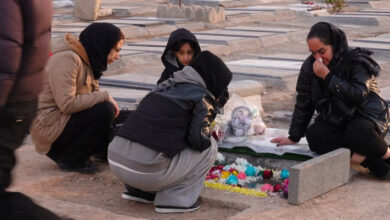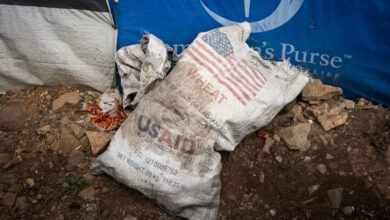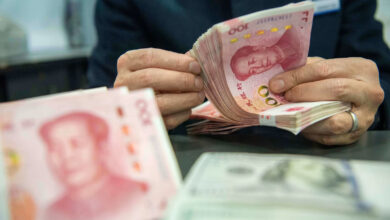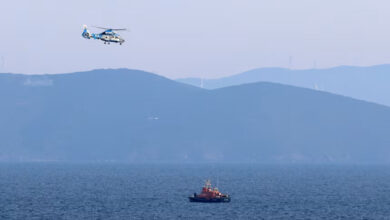Mohamed ElBaradei’s announcement that he is nominating himself for presidency has left me as perplexed as hints by Amr Moussa that he, too, might run for elections. I have a relationship of respect with Moussa, a brilliant colleague from secondary school, and I enjoy his company, although our meetings are fairly infrequent. He reminds me of the Nasserist era, and I admire him enormously.
I haven’t had the chance to meet ElBaradei, except very briefly through satellite television. But my trusted friends have all agreed that he’s poised, gracious, modest, sagacious and has a strong personality. He’s a liberal, even a radical one, they say. Unlike me.
Since the issue of nominations for the two were raised by the press, I have realized that Moussa is in a weaker position. ElBaradei, at the time he announced he would run, was about to leave office as director general of the International Atomic Energy Agency (IAEA), while elections for Moussa’s position as secretary general of the Arab League are more than a year from now, and Moussa might run for a third term.
Moussa’s position is further more precarious because he’s essentially part of the regime. Although Moussa was removed from his post as foreign minister, the regime still continued to woo him and he, for his part, remained faithful to the conservative Egyptian political line, managing to reformulate its policies in a way that was more appealing to the public. ElBaradei, on the other hand, only worked at the Ministry of Foreign Affairs for a few years, after which he spent most of his life working for the United Nations. The Egyptian regime clearly opposed him when he nominated himself for the leadership of the IAEA. Not only that, but the regime also nominated an ambassador from the Ministry of Foreign Affairs for the same position.
Moussa’s position is also weaker because of his performance as secretary general of the Arab League. It’s true that the IAEA hasn’t made any impressive achievement in the eyes of the public, but still however the Arab League is viewed as a failing entity in the eyes of the majority. It’s also true that both entities have had their share of crises with their members, but there remains a difference between the two. Moussa was criticized by Arabs only occasionally, while ElBaradei was continually pressurized by superpowers led by the United States, and he even defied them on issues such as the invasion of Iraq and Iran.
In addition, Moussa is in a weaker position because he’s likely to be less resolute in his competition against the NDP candidate. Many believe that if Mubarak runs for elections, Moussa will find it highly embarrassing to stand as his rival. If the NDP candidate turns out to be Gamal Mubarak, then, despite statements by Moussa that imply he opposes the transfer of power, Moussa will most probably think twice about fighting the elections.
Moussa again is in a weaker position because he never publicly criticized the state of affairs in Egypt, while ElBaradei’s statements on el-Ashera Masaan (10 P.M.) showed his deep dissatisfaction with the situation in Egypt. We can thus confidently state that ElBaradei will be a serious rival in the elections, but no one knows what kind of rival Moussa will be. Moussa is famous for being a tough nut, but he’s also known to be a cunning politician when it comes to bargaining and political agreements.
My comparison ends with one point in Moussa’s favor. Moussa has a popular base who are mesmerized by his talk and charisma. ElBaradei, on the other hand, seems to be more of a mystery to the people because of his long stay abroad, his position at the helm of an organization not interested in the day-to-day concerns of the people, and his limited appearances on TV.
But those comparisons carry no real weight until the two publicly announce that they are running for the elections. ElBaradei has taken that decision, and on that day, I, too, made my decision. It’s not about Nasserism and liberalism or a person we know well and another only a little. Egypt is yearning for change, and here is one of its respectable sons standing up to bring about the change we want. The trickiest aspect about the nomination of ElBaradei is that the regime cannot work its clever ploys with such an internationally-acclaimed person, or else it would scandalize itself before the entire world.
ElBaradei announced his decision on CNN, the biggest global news network, and the regime’s proponents were quick to criticize him as though, if he had made his announcement on Egyptian TV, they would have allowed him to meet with reporters, or even reported it as news on official TV. Those who relegated the announcement to the back pages of their national newspapers would never have permitted ElBaradei to make such an announcement except on the stairs of the Journalists Syndicate, besieged by scores of central security forces.
A ridiculous media campaign was launched, rife with false information, spurious arguments, trickery and shameful hypocrisy, opening the floodgates to vulgarity and rudeness. The regime proponents said that ElBaradei has dual citizenship: a Swedish or Austrian nationality. But circulating rumors, not denied by any, that the policy secretary of the NDP himself and other officials have dual nationality, turned the tables on such tricks.
They called ElBaradei the "imported president" and competed to measure the length of his stay abroad. However Egyptians are content that their candidate was far away from all the corruption, suppression, deals, crises, and fraud plaguing Egypt. ElBaradei is aware of the situation in Egypt, which he described as "worse than inhumane" on Dream TV, and "not OK" on CNN.
If we call ElBaradei the "imported president" then we should rightfully label Gamal Mubarak the "settler president." If ElBaradei hasn’t visited his hometown in Abyar, then how many times has Gamal Mubarak visited Kafr Musilha? The proponents of the regime found in Facebook campaigns yet another reason to pounce on ElBaradei. They scoffed at those Facebook campaigns, forgetting that calls to support Obama started on the internet, however different the two countries may be. They seem to ignore the fact that, at every occasion, the ruling party prides itself in using the internet.
The proponents of the regime claim that ElBaradei’s experience isn’t appropriate for as sensitive and complex a position as the presidency. But what was President Mubarak’s experience when he came to power? What experience does Gamal Mubarak have, apart from his experience in banking and his partisan knowledge, strictly defined by his being a member of the presidential palace? And who among the candidates can rise to the level of a Nobel prize laureate who has 13 honorary degrees, a considerable legal background, and connections with the most important leaders and organizations in the world?
The situation degenerated even further, with questions being raised as to whether ElBaradei occupied the last position in his class at the Ministry of Foreign Affairs, or the last but one position. But how could the Ministry of Foreign Affairs include someone as dim as two members of Egypt’s most important delegations abroad, in New York and Geneva? And whose mistake is it, ElBaradei himself, or the one who dispatched him? And what papers qualified those pro-regime officials for national positions anyway?
The wild accusations took a new twist when it was said that foreign countries held sway over ElBaradei, and that he had taken a stand against his country to serve Western interests. They even said he belongs to the American Camp, and that he played a role in supporting the US decision to invade Iraq. Then the questions were: Who’s the US’s strategic ally, ElBaradei or the regime? Why did President Mubarak honor him by giving him the highest Egyptian reward if he’s an agent? Is he an agent working for the US or for Iran? If he’s in a tight corner for having worked at an international organization, then what about the President’s son, who worked for a foreign bank?
The campaign intensified, accusing ElBaradei of disrespecting the Constitution because he attached preconditions to his nomination in order to guarantee the integrity of the election process. Weren’t the very same people who are now crying over the Constitution the ones who tailored it so that presidential nominations would be restricted to the president, his son and their supporters? They seem unable to recall that the Constitution was amended twice in less than two years. In cold blood and no time at all, amendments to 34 Articles of the Constitution were approved by the People’s Assembly. Still, Ali Eddin Helal said it was illogical to amend just two articles of the Constitution, although he knows very well that those two articles are unlike any other articles, and that the Constitution should be amended in particular because of those two articles. At a forum he attended in Washington, Helal even went as far as to ask ElBaradei if "a person in the US or any other country can call to have the constitution amended as a precondition for nomination?" But let me ask: Is your constitution Mr. Helal like the US constitution? And does any constitution in the world include an article like Article 76, which almost states that the first name of the candidate for presidency should start with a "G" and the surname with an "M"?
Then the opponents used what they thought was their deadliest weapon yet. ElBaradei is a candidate with no platform, they said. But everyone has seen him on TV talking about the broad lines of his platform. ElBaradei’s platform includes establishing good governance, emphasizing popular participation, setting up a committee to draw up a constitution that strikes a balance between the three estates, limiting presidential terms to two, and securing freedom and democracy. He said that progress is based on a proper educational system and that the people have the right to education, medical treatment, and hope, and that Egypt derives its strength from belonging to and leading the Arab World.
He does, then, have a plan for a detailed platform, and a clear intention to nominate himself. The only setback he suffers is that he has exposed the regime, and the reality of the so-called elections, and demonstrated to the people that with the current constitution and regime, candidates from outside the regime stand no chance of success. His only mistake is that his nomination has dragged the official media into a fierce campaign, in which everybody seems to be irrational.
I remember that one member of the Policy Council said, "Are we going to blow everything away for the sake of one man who’s making a fuss?" Mofeed Shehab was no less agitated by the nomination of ElBaradei and similarly wondered why the issue was receiving so much attention. But he quickly adopted the mentor’s hat, advising ElBaradei to engage in politics and partisan activity for no less than "eight or nine years" before thinking of the presidency. Is it by coincidence that this is the exact number of years Mubarak served as vice president and the length of time Gamal Mubarak has been involved with the NDP? Shehab, who suffered in the prisons when he belonged to the opposition and then suffered again to serve the interests of the regime afterwards, poses the following question to ElBaradei: "What is it that you know about Egypt? What do you know about its people? You haven’t suffered as much as them, nor do you have political experience or international relations that qualify you for the presidency." Not even international relations?! In fact, if we deny that he possesses any advantage, still his international connections remain the hardest to refute.
But Shehab hit the nail right on the head. The people are suffering. Absolutely right. The people are suffering because of unemployment, poverty, illiteracy, corruption, suppression, renal failures, high prices, death on emigration boats and Red Sea ferries, road and train accidents, drinking sewage water, sewage irrigation, randomly-built houses and randomly-taken decisions, bread and gasoline crises, lack of an education system, a rift in national unity, taxes, violence and crime.
Terrible suffering. But ElBaradei has come to pull us out of this mire. We are aware that the road is long and will involve suffering for both him and us. Some wicked person even told me they might plant some hashish on him when he arrives in Egypt. That shouldn’t be surprising, considering what they did with Noaman Gomaa and Ayman Nour. But I insisted that the regime was more intelligent, and wouldn’t stoop so low. They might simply give orders to air traffic controllers to instruct ElBaradei’s plane to return back to where it came from, because Egypt’s sky is going to be overcast for a period of time the length of which is unpredictable. Well, that’s truly the case. But they will more likely allow his plane to land, then announce he has the H1N1 virus and have him quarantined at the Fever Hospital, or force him, like the pilgrims, to stay at home until the presidential elections are concluded in 2011.
Translated from the Arabic Edition.




